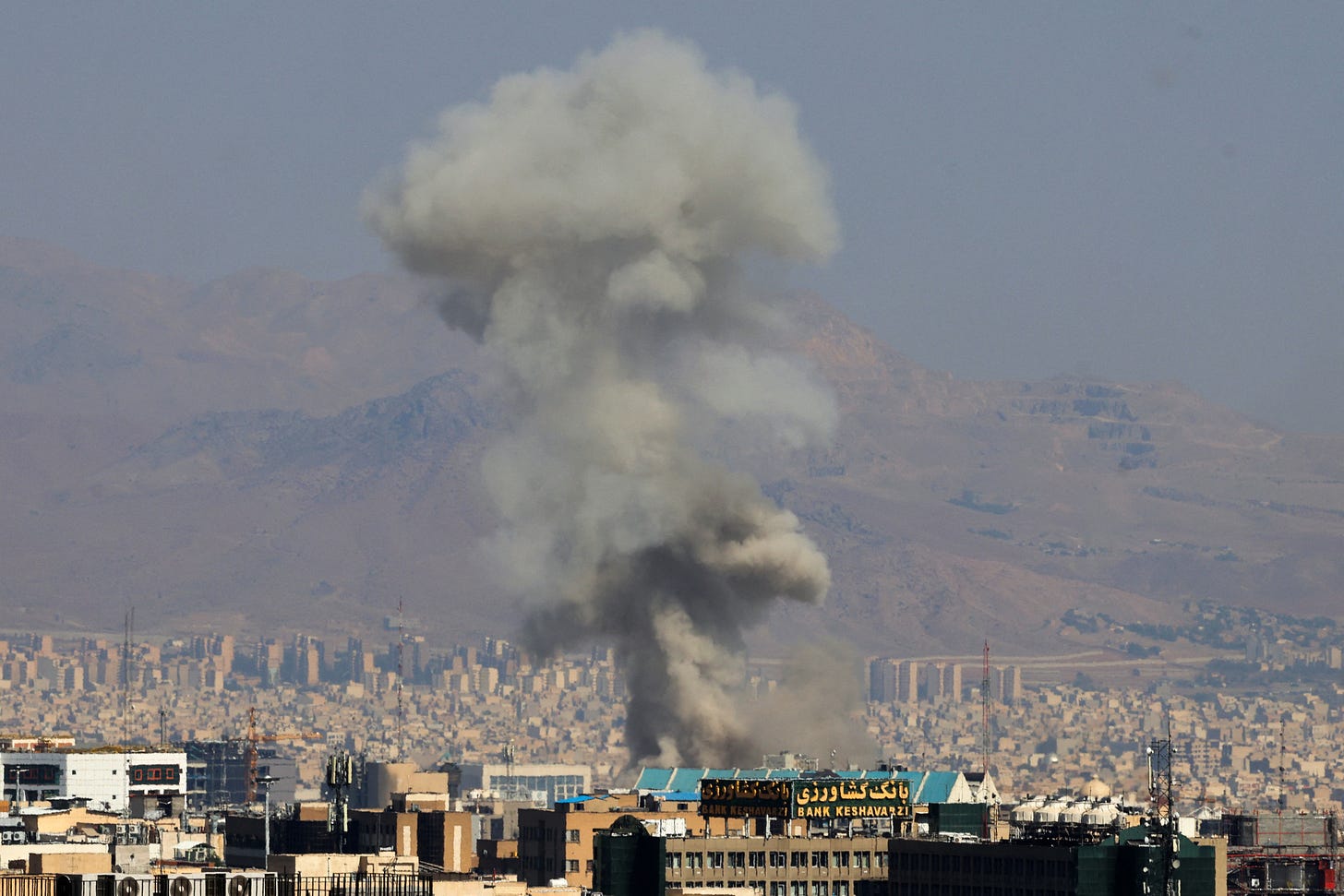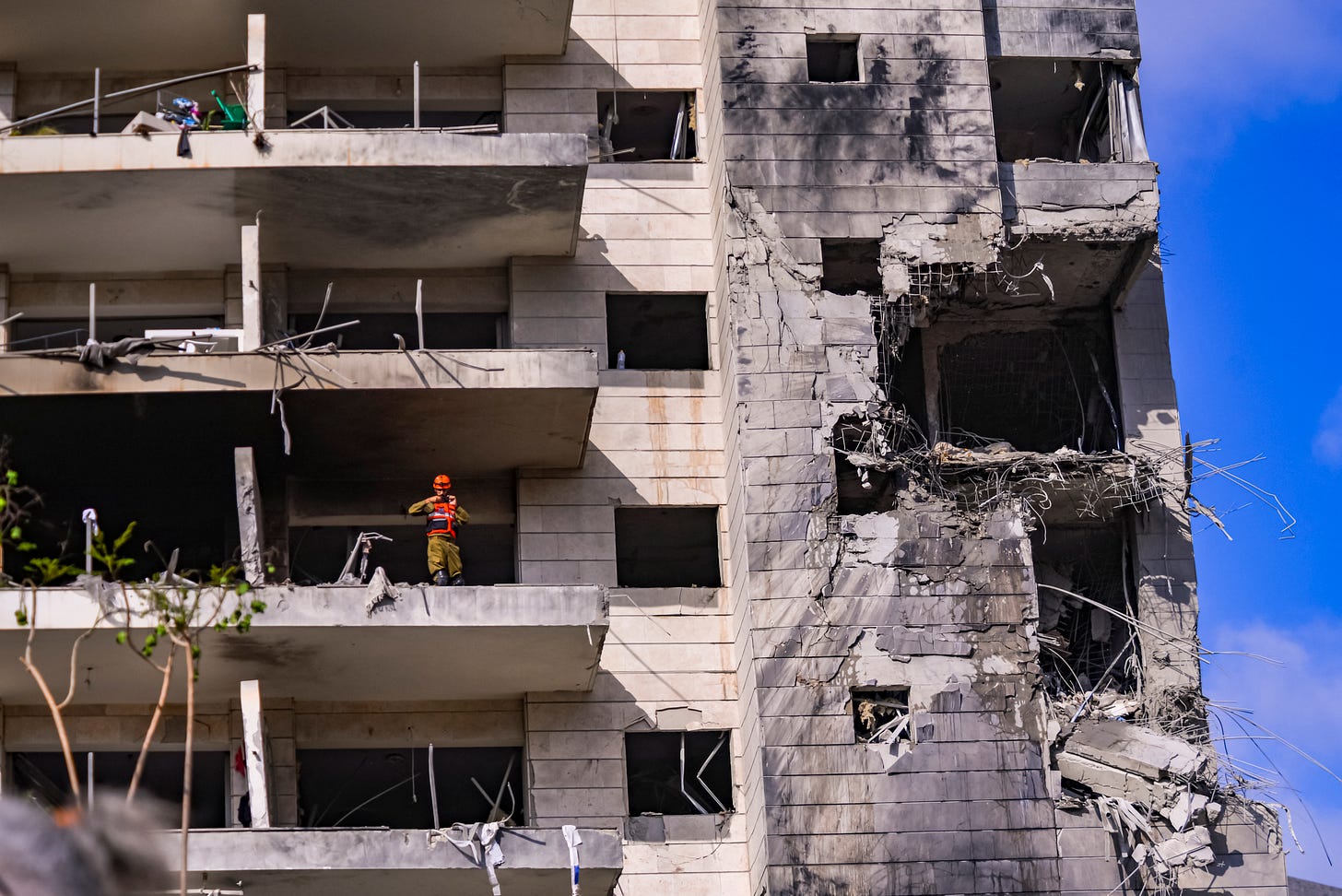America First or Israel First? Will Trump Join Netanyahu's War on Iran?
Former Israeli peace negotiator Daniel Levy on what's driving Netanyahu and why this will be a defining moment for Trump's MAGA movement.

It surely comes as no surprise that in the context of Israel's latest “war of no choice,” it has targeted and caused mayhem in civilian areas in Iran. In another unprovoked Israeli war of aggression, the starting point is that there is no such thing as international law or a distinction between combatant and civilian (that's not to suggest that Israel's adversaries adhere to such standards either, but they are sanctioned by the West, while Israel is enabled).
Israel itself coined the term the “Dahiya doctrine” (named after the Beirut suburb), to describe the crime of terrorizing an urban civilian population. That doctrine is now being applied to Tehran.
It’s no surprise, either, that Israel has bombed Iranian TV (taking out journalists has become something of a sport for Israel's military in Gaza). But this is not Palestine, not Gaza.
Israel's goal is not to ethnically cleanse and then settle Iran. Given this truth and the transparently fabricated nature of Israel's claim that it had no choice but to act now, having failed to produce any evidence that Iran posed an imminent threat or that Iran was racing to weaponize its nuclear enrichment program, we must seek an explanation for the nature and timing of Israel's actions elsewhere.
Why Now?
Iran, as we are now witnessing, does have the capacity to inflict a level of pain on Israel, but it has only done so when provoked (as happened on a smaller scale last year). Surely, the headline since Israel launched its genocidal campaign against the Palestinians has been Iran's choice to sit on the sidelines – that the ‘leader of the Axis of Resistance’ was not a constraining factor on Israel.
Domestic politics, especially when it comes to Prime Minister Benjamin Netanyahu and his personal and political calculations, is never a bad starting point in understanding the decision-making in Israel. Netanyahu has been running out of political road, and although he has stabilized his government, his coalition has been in serial crises, and he has trailed substantially in the polls for 20 months. Israel is already heading to the campaigning start-line in advance of elections by next autumn, but perhaps considerably earlier.
Given the extent to which Iran looms in Israeli threat perceptions, much-hyped for decades by Netanyahu himself, and given the sense of success in decapitating and defanging Hezbollah, going after Iran is one of the last and most dramatic political dice Netanyahu could roll. It's something Netanyahu has for decades threatened but desisted from. However, his political calculation is more desperate today, and he may well have concluded that any further progress in the Omani-hosted US/Iran talks would produce a US stop sign and close the door on this option for good – or at least for the duration of time before Israel's election.
Netanyahu was hoping that strikes on Iran's nuclear facilities and missile launching sites, a leadership decapitation (notably on the military and civilian-scientific side), and riding the wave of cool espionage/tech interventions would not only be considered a national success but an on-ramp to personal political revival.
Perhaps the Israeli system is drinking its own Kool-Aid on regime change prospects; anyway, the likely more desirable scenario for Tel Aviv would be maximal state collapse, chaos, and fragmentation in Iran – a version of Libya or Syria on a grander scale.
The gamble was that Netanyahu and the Israeli system knew this was unlikely to be a cakewalk – that Iran has a response capacity. The euphoria of the first night of strikes generated a reunifying consensus among the Zionist political spectrum. But that is partially turning to uncertainty after successive nights of Iranian missiles penetrating both Israeli military and civilian sites.

It is useful to understand that the tone inside Israel – among much of the commentariat, political, and security class – has shifted to an acknowledgment that while Israel has scored major hits, it is apparently not close to removing Iran's nuclear enrichment or ballistic missile infrastructure, and doubts are surfacing as to how long Israel could sustain absorbing Iranian counter strikes (to put it bluntly, the pain threshold and economic resilience modalities of the two countries look very different).
Consensus is a rare thing in Israel, but in the Zionist camp, there is near unanimity that everything will depend on one key variable: whether or not the US directly joins Israel's military campaign. That game-changing factor is not only about the balance of forces; it is likely viewed by Netanyahu as his electoral meal ticket.
Netanyahu and the Israeli system are coalescing around that singular purpose – drag Trump in.


